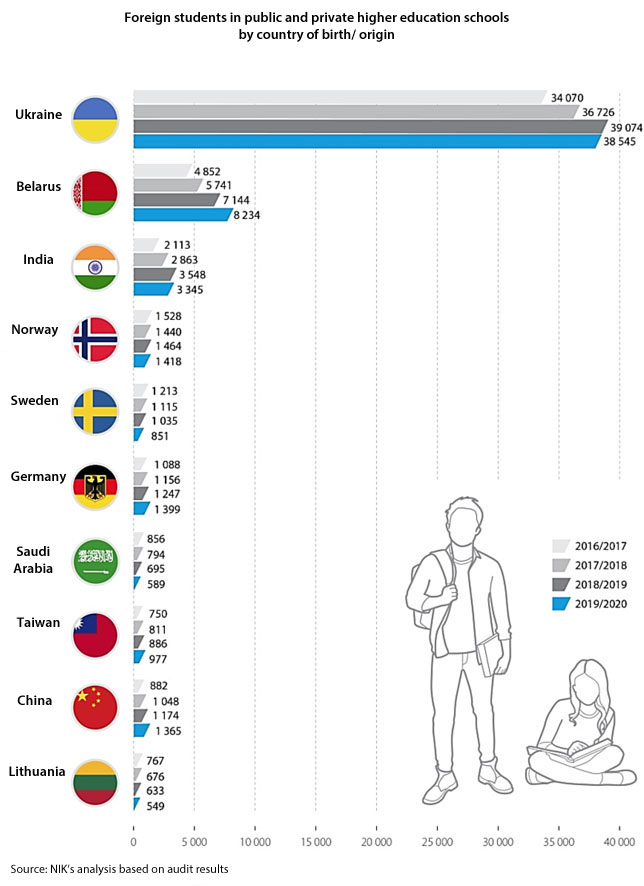There are more and more persons from abroad studying in Polish colleges and universities. In school year 2016/2017, there were about 61 thousand foreign students, whereas in school year 2019/2020, the total exceeded 77 thousand foreigners. That stands for a 27% increase. At the end of 2019, most students came from Ukraine (38.5 thousand persons), Belarus (over 8 thousand persons), India (over 3 thousand persons), Norway, China, Germany (1.4 thousand persons from each). The most popular majors in school year 2019/2020 included: medicine (7.4 thousand persons), management (over 2 thousand persons), IT (1.7 thousand persons), international relations (1.2 thousand persons) and dentistry (1.1 thousand persons).

The process of internationalising higher education in Poland is to foster development of Polish colleges and universities and to improve education quality, as well as to stimulate our country’s innovativeness. This is an opportunity for higher education schools to adopt the best practices but also an organisational challenge. The schools’ internationalisation level is also taken into account in college and university rankings.
In line with the data of the Organisation for Economic Cooperation and Development in 2017, the average higher education internationalisation rate was 8.9%, and in 2018 – 9.2%. Poland is below that value – in 2017 the percentage of foreign students was 4.1% and in 2018 - 3.6%.

Key audit findings
In 2017-2020, the Polish state provided adequate legal and organisation conditions for recruitment and education of foreigners in Polish colleges and universities, and also properly financed that task. Joint efforts of the Minister of Science and Higher Education, the Minister of Foreign Affairs, the National Agency for Academic Exchange and the audited higher education schools helped to gradually improve the higher education internationalisation rate in line with the foreign policy priorities and assumptions of development cooperation, adopted by the Council of Ministers. An increase in the number of foreigners was related among others to the implementation of scholarship programmes. That tendency was also supported by structural changes and sound cooperation of the audited entities.
The Minister of Science and Higher Education orders public colleges and universities to implement aid programmes for foreigners. Besides, while dividing subsidies for higher education schools the Minister rewarded the ones where foreigners undergo full-cycle studies. He also started legislative works which resulted in establishing the National Agency for Academic Exchange on 1 October 2017. The Agency implements the state’s long-term policy fostering individual academic mobility and promoting Polish higher education abroad. The Minister spent nearly PLN 117.7 million on programmes addressed to foreigners, of which nearly PLN 101.2 million covered targeted grants for the National Agency for Academic Exchange and nearly PLN 15.3 million financed four aid programmes for foreign students.
The National Agency for Academic Exchange performs its tasks related to the education of foreign students in accordance with applicable law and based on properly conducted identification of needs. It carried out four scholarship programmes for foreigners studying in Polish colleges and universities, such as the General Anders Scholarships for the Polish Diaspora. The number of foreign students covered by the Agency’s scholarship aid every year increased from 3 121 persons in 2018 to 3 353 in 2019. Those measures were taken under the Draft strategy of the National Agency for Academic Exchange 2018-2025. Until the audit ended, no long-term strategy was developed.
The Minister of Foreign Affairs supported foreigners’ education in Poland by taking measures defined in the annual Plans of development cooperation arising from the Long-term development cooperation programme for 2016-2020 adopted by the Council of Ministers. NIK stands in a position that those plans were tailored to identified needs and possibilities related to educating overseas students. They were also consistent with the foreign policy priorities adopted by the Council of Ministers. In 2017-2019, the Minister earmarked nearly PLN 2.87 for scholarships for foreigners. He financed among others education of Ukrainian students in the College of Europe in Natolin or students from the countries of Western Balkans. Besides, the Minister implemented the Visegrad Scholarship Programme, developed as part of measures taken by the International Visegrad Fund.
Universities analysed needs related to education of foreigners. They properly assessed possibilities of educating foreigners, conducted recruitment for universities and financed education, took account of the possibility of educating foreigners in planning documents in their faculties. Though, in five universities (out of 18 audited ones) the assessment of foreigners’ education possibilities was not documented. One university did not adopt any strategy, which was a breach of the law. It also happened that foreigners were recruited without required documents, tuition fees were not properly collected or registered, and in some cases data was provided with delays.
In 2019, the percentage of foreign students reached 6.4%. In that way, the higher education internationalisation level in Poland planned at 5% in the Human Capital Development Strategy 2020 was achieved in advance. But it is still lower than the average of other OECD countries which is 8.9%.
According to NIK it is unrealistic that the target of 100 thousand foreign students in Polish colleges and universities in 2021 will be achieved (that target was defined in the Long-term plan for cooperation with abroad of the Ministry of Science and Higher Education. This thesis is supported by the fact that in school years 2016/2017 - 2019/2020 the number of foreign students went up only by 16.3 thousand persons, whereas in school year 2019-2020 it was only 2.9 thousand overseas students more. The COVID-19 epidemic and related restrictions concerning movement are not without significance.
Recommendations
Considering the risk that the target of 100 thousand students in 2021 may not be achieved, NIK has recommended that the Minister of Science and Higher Education, the Minister of Foreign Affairs, the Director of the National Agency for Academic Exchange should review their plans and intensify efforts to foster education of students in Polish colleges and universities.
The audit covered the period 2017-2020 (until 31 July). NIK audited the Minister of Science and Higher Education, the Minister of Foreign Affairs, the National Agency for Academic Exchange and 18 public universities. A questionnaire was made in 107 public higher education schools supervised by the ministers.


